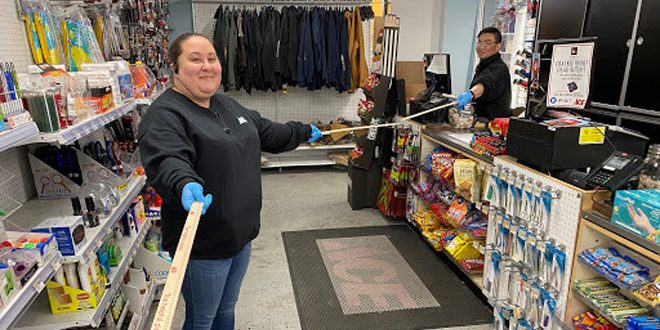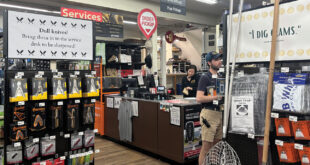Independent home improvement retailers across North America have shown their resiliency by swiftly changing how they do business in response to the COVID-19 pandemic.
In most U.S. states and Canadian provinces, governments have deemed businesses selling home repair supplies and building materials to be essential. Retailers are proving why they are so important to their communities as they provide the supplies area residents need for sanitation and home repairs and support their employees in the face of illness and fear.
Implementing frequent deep cleaning, modifying store hours and trying to stock high-demand products were just the beginning of retailers’ challenges.
Business owners in the industry have shared the following stories with Hardware Retailing about how they are functioning amid a public health crisis like nothing they have ever seen.

Protecting the Team
Balancing care for both employees and customers has forced Eric Hassett, owner of five Hassett Hardware stores in the San Francisco Bay Area, to reassess how he does business every day.
Hassett isn’t pushing concerned employees to work, especially if they are particularly vulnerable to contracting COVID-19 due to their ages or health conditions.
“This is a challenging time, and my employees are scared,” he says.
Recently, Hassett closed one of his stores for two days because he didn’t have enough employees available to keep all five locations open safely.
Hassett has furloughed many employees who are 60 and older, those who have pre-existing conditions that put them at risk or are caring for family members in either category so they can receive unemployment benefits while they isolate. To Hassett, that’s part of taking care of his team.
For employees who are willing to staff the stores, Hassett has offered temporary hazard pay raises, paid for team lunches and snacks and allowed them to buy products at cost.
Hassett is looking constantly for balance in keeping employees safe while still providing his community with the products they need. He talks through decisions with other business owners so he can make informed choices for his business and his team.
“There’s a moral quagmire we’re all in,” Hassett says. “Are we putting our employees at risk by having them work? Especially when we’re selling a lot of nonessential things? I struggle with that because I don’t want to put them in harm’s way.“
Through uncertainty, Hassett remains thankful for his community.
“Our community is supporting us and is appreciative of our hard-working heroes, which means we need to keep our team safe and healthy to continue to serve,” he says.

Curbside Service
Many retailers are switching to parking lot customer service to reduce the spread of germs in the store and to reinforce social distancing.
For example, O’Donnell Ace Hardware in Clinton, Iowa, takes orders over the phone for pickup. When the customer arrives, employees take their purchases to the parking lot. Manager David Larsen still lets customers in the store, but asks employees to stay 6 feet away from them as much as possible.
“My main concern is doing everything we can to keep our staff healthy and provide the service our customers are used to,” Larsen says.
Joe and Susan Wasko, owners of Wasko Hardware in Keosauqua, Iowa, decided to close their store’s doors to the public in early April after they heard one of their customers had contracted COVID-19.
Their county now has multiple confirmed COVID-19 cases. When a Wasko Hardware customer got so sick he was flown by helicopter from the local hospital to a larger hospital and put on a ventilator, the Waskos reacted quickly. They set tables outside their store to provide customers with a place to pick up product orders without interacting much with employees.
“He’s a customer we hold dear to our hearts,” Susan Wasko says. “That really wakes you up when it’s somebody you know who comes to the store regularly. When something like this happens, you put your heads together and make a decision.”
When the Waskos decided to transition to curbside service only, they used Facebook Live to share the news with customers. In less than one week, 2,300 people had viewed the video, reflecting the fact that people beyond their 1,000-resident community rely on their business.
The Waskos now answer customer questions and help diagnose home repair problems at the tables outside the store, but try to keep their distance.
They encourage people to make their product orders over the phone, but they still serve customers who come to the store without calling ahead.
The Waskos and their employees fill bags with products and run back and forth between the register inside and the exterior tables to process payments. They place filled bags on the tables or near the front door and ask customers to come and get them.
“My main concern is doing everything we can to keep our staff healthy and provide the service our customers are used to.” —David Larsen, O’Donnell Ace Hardware
“Whoever answers the phone gets that customer’s order ready, bags and tags it, and we put it by the front door,” Susan Wasko says. “If we see a customer come up to the front door, then whoever’s there waits on them. I’m just so thankful we can stay open.”
Grand River Home Hardware in Caledonia, Ontario, and Sayer Home Hardware in Hagersville, Ontario, are also primarily offering curbside service.
Customers aren’t allowed inside the store, unless they have an urgent need that can only be resolved in that manner. When that is the case, the stores allow one customer in at a time, which was implemented according to a government mandate.
“I never thought we’d do something like this,” owner David Dishke says.
For the most part, employees take product orders online and via phone or email, then allow customers to pick up their orders in the parking lot.
“We are still trying to provide our customers with the products they need and the best service we can during such challenging times,” co-owner Deanna Dishke says.
Through the stores’ Facebook and Instagram accounts, the Dishkes keep customers up to date on changes, such as the fact that the stores have temporarily stopped accepting product returns.
“We are hugely reducing the risk by all the steps we’re taking,” David Dishke says. “It’s like putting armor on. I’m doing what I can to reduce the risk to the staff with the supplies we have.”
More Business Changes
Spring and summer are busy for Missouri-based Thorne Lumber Co. due to the company’s professional customers, who are continuing to build the projects they started prior to government shutdowns and other responses to COVID-19.
 Chief operating officer Brett Thorne has set up new protocols to protect his staff. He had plexiglass guards installed at the checkout counters to protect retail customers and staff and he reorganized how employees work in the lumberyards so they aren’t exposed to other people much on the job, just in case someone gets sick.
Chief operating officer Brett Thorne has set up new protocols to protect his staff. He had plexiglass guards installed at the checkout counters to protect retail customers and staff and he reorganized how employees work in the lumberyards so they aren’t exposed to other people much on the job, just in case someone gets sick.
“We are no longer putting employees next to each other in delivery vehicles, meetings or other settings,” Thorne says. “Each one of the counties where our operations are located has COVID-19 cases.”
Adam Taylor with Trust Hardware in Lawrence, Indiana, and his staff have been making more deliveries than prior to the pandemic.
“We’ve been delivering to people who are either too scared to leave or are not able to leave home,” Taylor says.
His team has also been taking products to people waiting outside the store in their cars so they don’t have to enter the building.
The staff at Village True Value Hardware in East Hampton, New York, also serves an increasing number of customers who are asking for home delivery and curbside pickup. Some shoppers want orders to be loaded in their vehicles for them at the store so they have minimal interactions with staff.
Village True Value customers’ anxiety seems similar to how they react during hurricanes, except COVID-19 doesn’t have the familiar pattern of the storms that come to the area, says manager James Boyd.
“It’s like a hurricane that never ends. We’re trying to keep people calm,” he says. “We live here. These people matter.”
Weakley-Watson Hardware owner Weston Jacobs is also doing business differently in response to the virus in in Brownwood, Texas.
Out of necessity, he has implemented a no-handshake policy for his staff, which most customers have understood as a safety measure.
“We have become more of a self-service type store, pointing people where to go and running a lighter staff,” Jacobs says.
 Hardware Retailing The Industry's Source for Insights and Information
Hardware Retailing The Industry's Source for Insights and Information








